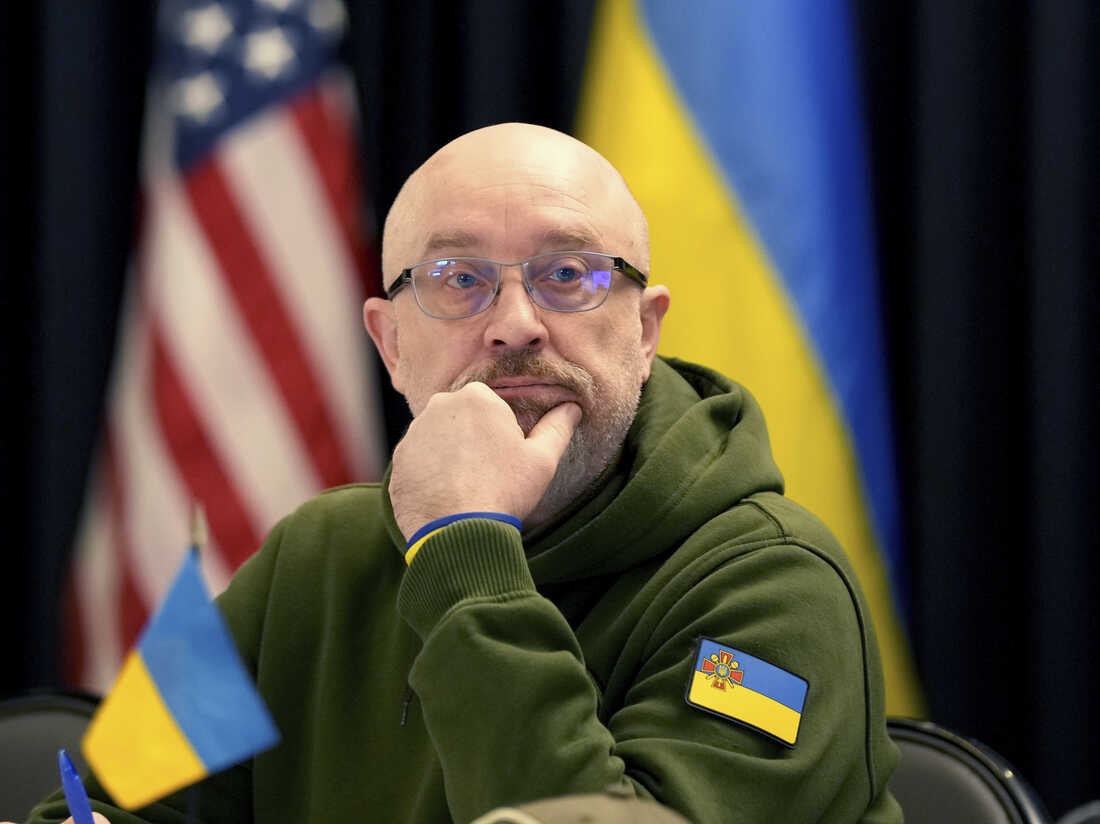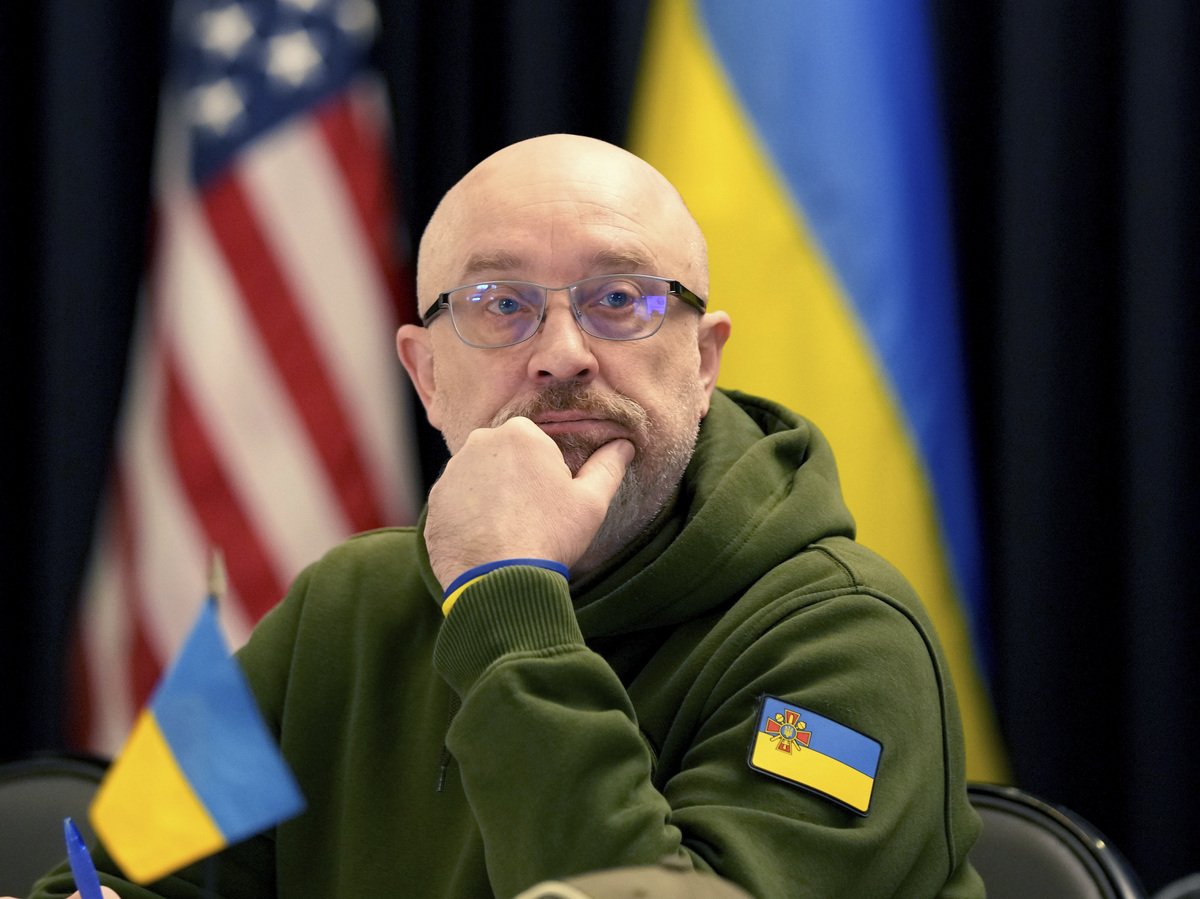Ukraine's defense minister pushes for fighter jets, even as training begins on tanks

Ukrainian Minister of Defense Oleksii Reznikov attends the meeting of the Ukraine Defense Contact Group at Ramstein Air Base in Ramstein, Germany, Jan. 20. Michael Probst/AP hide caption

Ukrainian Minister of Defense Oleksii Reznikov attends the meeting of the Ukraine Defense Contact Group at Ramstein Air Base in Ramstein, Germany, Jan. 20.
Michael Probst/APKYIV — Ukraine's Defense Minister Oleksii Reznikov says he's optimistic Western allies will eventually supply his country with advanced fighter jets, including U.S.-made F-16 fighter jets, and adds that Ukrainian forces are poised to start training on newly committed advanced battle tanks "as soon as possible."
"What is impossible today is absolutely possible tomorrow," he tells NPR.
Speaking with NPR on Saturday, Reznikov said he hopes Ukrainian troops will start training on Leopard 2 and Abrams tanks, which Germany and the U.S. promised last week to donate to Ukraine. The U.K. is already training Ukrainians on its Challenger tanks, and is sending Ukraine 14 of them.
"My understanding is that there are training courses we can do in Europe," Reznikov says. "It's more convenient because we have to use a similar landscape and we have to have similar weather conditions."
He tells NPR he's hoping for fast-track training, which he says is what's planned for the Patriot air defense missiles the U.S. promised President Volodymyr Zelenskyy in December. The U.S. started training Ukrainians on them at Fort Sill, Oklahoma, this month.
"Normal training courses for Patriot consist [of] 10 months," he says, but Ukrainian troops will train with military in the U.S. for "probably 10 weeks."
"For the Leopard tanks, for example, [training] normally could be half a year. But I hope that we will do it during one month or probably two months," he says adds.
Reznikov says Ukraine also needs time to set up supply chains for fuel and spare parts and also train mechanics to maintain and repair the new tanks. But he adds that these new tanks will be a "game changer" as Ukraine tries to reclaim occupied territory, just as HIMARs (High Mobility Artillery Rocket Systems) helped Ukrainian forces reclaim the southern city of Kherson in November.
Ukraine wants fighter jets
Reznikov is also pushing for fighter jets, specifically F-16s, which have been on Ukraine's list since the beginning of the Russian invasion.
"I'm sure that's absolutely realistic," he says about the F-16s, noting that in the past, Ukraine has also secured other weapons that at first seemed out of reach, including HIMARS and Patriot air defense missiles.
President Biden seemed to suggest on Monday that the U.S. would not donate F-16s to Ukraine, and German Chancellor Olaf Scholz told the Tagesspiegel newspaper published Sunday that "the question of combat aircraft does not arise at all."
Reznikov says in the past, most Western allies have turned down weapons requests for practical reasons, such as difficulty in finding spare parts. He says when he asks allies about the F-16, they cite "a very long training period for [Ukrainian] pilots." He says he can offer a powerful counter-argument by proving that Ukrainian troops can carry out shorter, very intensive training on other weapons.
Russia, meanwhile, has accused the West of taking a more direct role in the war by sending more sophisticated weapons to Ukraine. That's caused tension within NATO and the European Union. Croatia's President Zoran Milanovic told reporters that supplying arms to Kyiv will only prolong the war and that it's "mad" to expect Russia's defeat. And Hungary's Prime Minister Viktor Orban said Ukraine's Western backers had "drifted into war."
Corruption remains a concern
Reznikov says he knows Western allies are scrutinizing Ukraine's government closely. Ukrainian journalists recently reported that Reznikov's own ministry was sometimes purchasing food and other supplies for troops at inflated prices.
Before the Russian invasion, most defense ministry expenses were public. Now most are classified for security reasons. He says transparency is a delicate issue during wartime, but he is working with parliament to change laws and make defense expenditures at least "semi-transparent."
"It's not a piece of cake, but I will do it," he says. "Because my principle is zero tolerance with corruption. We have to be a new Ukraine, with the European standard, not the old-fashioned Soviet Ukraine with a legacy of corruption."
Read the full story here
Comments
Post a Comment